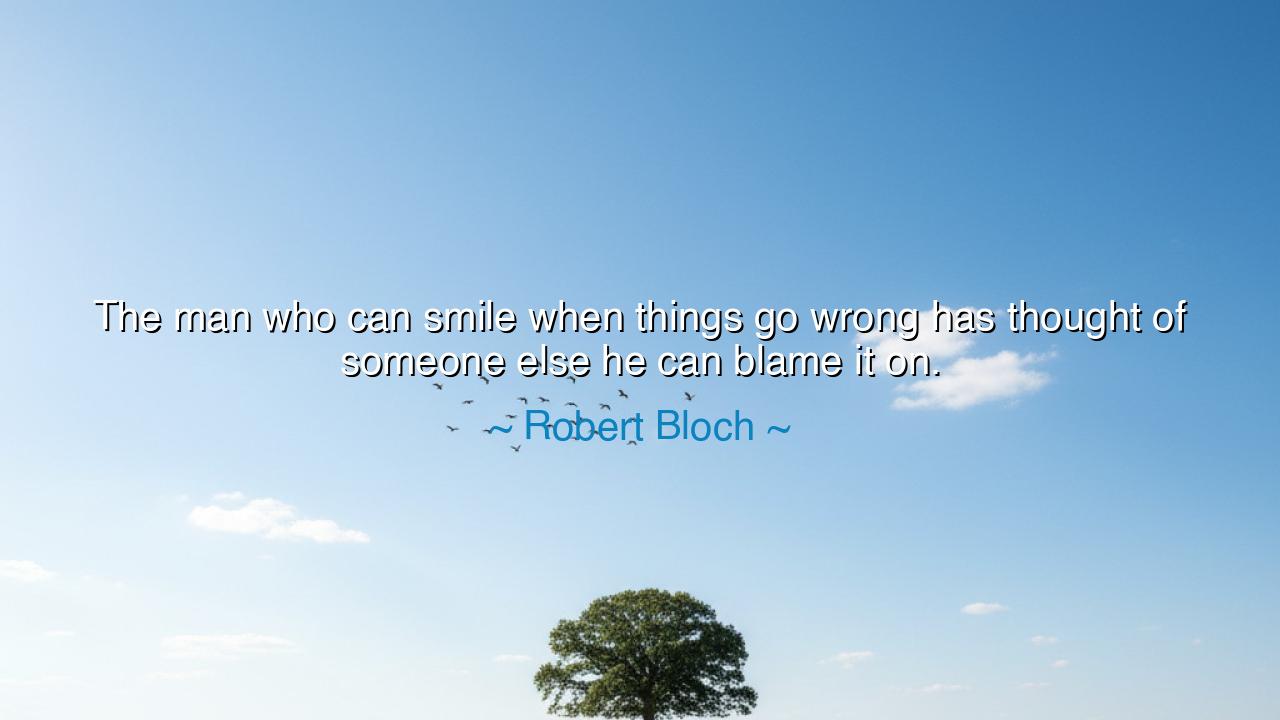
The man who can smile when things go wrong has thought of someone
The man who can smile when things go wrong has thought of someone else he can blame it on.






Hear now the sharp wit of Robert Bloch, who declared: “The man who can smile when things go wrong has thought of someone else he can blame it on.” At first, these words appear as jest, a fragment of humor tossed lightly into the air. Yet beneath their laughter lies a warning as old as mankind itself—the temptation to cast our burdens upon others, to preserve our own serenity at the expense of justice. To smile while chaos rages, not through wisdom or resilience, but through shifting the blame, is to wear a mask of strength while hollow within.
The ancients spoke often of this human failing. In the courts of Athens, men would stand accused not for their own deeds, but because others had pointed trembling fingers in desperation. To blame is easy; to accept fault is hard. Thus did Socrates, wise and steadfast, drink the hemlock not for crimes he committed, but for the fears and failures of others. His smile at the cup’s rim was not the smile of deflection, but of truth embraced. In contrast, Bloch’s figure is the man who grins falsely, made bold only by the weight he has pushed upon another’s shoulders.
Consider, too, the tale of the Roman general Varus, whose legions perished in the forests of Teutoburg. When word reached Augustus, the emperor tore his garments and cried, “Varus, give me back my legions!” Yet Varus himself had long since taken his own life, leaving no voice to accept the blame. For years, Roman senators debated, and whispers grew: was it the fault of the scouts, the fault of the weather, the fault of the emperor himself? In their grief, men sought to shift responsibility, that they might smile again without the bitter taste of failure. Such is the temptation Bloch exposes: to find another’s back on which to lay the stones of our own mistakes.
The quote, though clad in humor, is thus edged with truth. It reveals how human beings preserve their fragile sense of dignity not by confronting failure, but by cleverly casting it elsewhere. The smile then is not triumph over hardship, but the sly grin of escape, of one who thinks himself clever because another bears the shame. Yet such a smile is fleeting. For truth, like a river, will carve its way to the light. No man escapes forever the shadow of his own deeds.
What lesson, then, should we take? It is this: when things go wrong, do not first seek another’s name to shield your own. Look instead into the mirror of your conscience. Ask what you could have done, what you might yet do, to restore balance. The strength of a man is not measured by how quickly he casts blame, but by how bravely he accepts responsibility. A true smile in hardship comes not from evasion, but from integrity—the quiet joy of one who faces the storm without deceit.
History honors those who bore their burdens. Recall Abraham Lincoln, who in the darkest days of the American Civil War declared that the failures of the Union army fell upon his shoulders. Though generals faltered and campaigns collapsed, he did not hide behind them. He accepted the blame so his people might remain united. His smile, worn even in sorrow, was the smile of responsibility embraced, not shifted. And for this, history names him great.
Therefore, let us live with courage. When next calamity strikes, resist the easy laughter of blame. Instead, claim your part, learn, and grow. For though the world tempts us to deflect, the soul hungers for truth. In daily life, practice this: when mistakes occur, pause before your tongue casts guilt. Ask yourself, “What is mine to own?” and let that ownership strengthen you. A man or woman who lives thus will smile indeed—not in deceit, but in the heroic calm of one who walks honestly beneath the gaze of heaven.
So take Bloch’s jest as both laughter and lesson. Beware the hollow smile born of blame, and seek instead the noble smile born of truth. For in the end, though false laughter fades, the integrity of responsibility will shine eternal.






AAdministratorAdministrator
Welcome, honored guests. Please leave a comment, we will respond soon